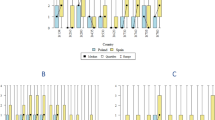Abstract
Study design:
Qualitative, multi-center study.
Objectives:
The objective of this study is to explore the aspects of functioning and disability that are relevant to individuals with spinal cord injury (SCI), using a comprehensive approach based on the International Classification of Functioning, Disability and Health (ICF).
Methods:
Forty-nine people with SCI from early post-acute and long-term rehabilitation settings participated in nine focus groups. Five open-ended questions based on the ICF were used to initiate discussion about relevant Body Functions and Structures, Activities and Participation, Environmental and Personal Factors. The focus groups were audiotaped and the recording was transcribed verbatim. Qualitative analyses included the identification, extraction and coding of meaningful concepts from the transcribed dialogue. Concepts were coded according to established rules using ICF categories and were summarized semi-quantitatively.
Results:
In the analysis, 1582 different concepts were identified. For coding one concept, an average of 1.4 ICF categories was used. This resulted in 2235 concept-ICF category links, 1068 in the early post-acute and 1167 in the long-term context, respectively. For the coding, 274 out of the 1454 categories contained in the ICF were used.
Conclusion:
The ICF coding showed the broad range of relevant aspects in the functioning experience of persons with SCI. Besides body limitations (especially paralysis and pain), the most relevant concepts covered mainly barriers in physical environment, assistive devices and social support, as well as the impact on everyday life regarding leisure and work. The resulting list of ICF categories can be helpful in facilitating person-centered clinical care and research.
Similar content being viewed by others
Log in or create a free account to read this content
Gain free access to this article, as well as selected content from this journal and more on nature.com
or
References
McPherson KM, Siegert RJ . Person-centred rehabilitation: rhetoric or reality? Disabil Rehabil 2007; 1: 4.
Gzil F, Lefeve C, Cammelli M, Pachoud B, Ravaud JF, Leplege A . Why is rehabilitation not yet fully person-centred and should it be more person-centred? Disabil Rehabil 2007; 29: 1616–1624.
Gittler MS, McKinley WO, Stiens SA, Groah SL, Kirshblum SC . Spinal cord injury medicine. 3. Rehabilitation outcomes. Arch Phys Med Rehabil 2002; 83 (3 Suppl 1): S65–S71, S90–8.
Stiens SA, Kirshblum SC, Groah SL, McKinley WO, Gittler MS . Spinal cord injury medicine. 4. Optimal participation in life after spinal cord injury: physical, psychosocial, and economic reintegration into the environment. Arch Phys Med Rehabil 2002; 83 (3 Suppl 1): S72–S81, S90–8.
Dijkers M . Quality of life after spinal cord injury: a meta analysis of the effects of disablement components. Spinal Cord 1997; 35: 829–840.
Duggan CH, Dijkers M . Quality of life-peaks and valleys: a qualitative analysis of the narratives of persons with spinal cord injuries. Can J Rehabil 1999; 12: 179–190.
Pentland W, Walker J, Minnes P, Tremblay M, Brouwer B, Gould M . Women with spinal cord injury and the impact of aging. Spinal Cord 2002; 40: 374–387.
White MJ, Rintala DH, Hart KA, Fuhrer MJ . Sexual activities, concerns and interests of women with spinal cord injury living in the community. Am J Phys Med Rehabil 1993; 72: 372–378.
World Health Organization. ICF - International Classification of Functioning, Disability and Health. WHO: Geneva, 2001.
Stamm T, van der Giesen F, Thorstensson C, Steen E, Birrell F, Bauernfeind B et al. Patient perspective of hand osteoarthritis in relation to concepts covered by instruments measuring functioning: a qualitative European multicentre study. Ann Rheum Dis 2009; 68: 1453–1460.
Kirchberger I, Sinnott A, Charlifue S, Kovindha A, Luthi H, Campbell R et al. Functioning and disability in spinal cord injury from the consumer perspective: an international qualitative study using focus groups and the ICF. Spinal Cord 210; 48: 601–613.
Clarke A . Focus group interviews in health-care research. Prof Nurse 1999; 14: 395–397.
Biering-Sorensen F, Scheuringer M, Baumberger M, Charlifue SW, Post MW, Montero F et al. Developing core sets for persons with spinal cord injuries based on the International Classification of Functioning, Disability and Health as a way to specify functioning. Spinal Cord 2006; 44: 541–546.
ASIA. International Standards for Neurological and Functional Classification of Spinal Cord Injury Patients. 1992 Revision. American Spinal Injury Association: Chicago, 1992.
Cieza A, Geyh S, Chatterji S, Kostanjsek N, Ustun B, Stucki G . ICF linking rules: an update based on lessons learned. J Rehabil Med 2005; 37: 212–218.
Dietz V, Sinkjaer T . Spastic movement disorder: impaired reflex function and altered muscle mechanics. Lancet Neurol 2007; 6: 725–733.
Preziosi G, Emmanuel A . Neurogenic bowel dysfunction: pathophysiology, clinical manifestations and treatment. Expert Rev Gastroenterol Hepatol 2009; 3: 417–423.
Whiteneck G, Dijkers MP . Difficult to measure constructs: conceptual and methodological issues concerning participation and environmental factors. Arch Phys Med Rehabil 2009; 90 (11 Suppl): S22–S35.
Cardol M, de Haan RJ, van den Bos GA, de Jong BA, de Groot IJ . The development of a handicap assessment questionnaire: the Impact on Participation and Autonomy (IPA). Clin Rehabil 1999; 13: 411–419.
Whiteneck G, Meade MA, Dijkers M, Tate DG, Bushnik T, Forchheimer MB . Environmental factors and their role in participation and life satisfaction after spinal cord injury. Arch Phys Med Rehabil 2004; 85: 1793–1803.
Acknowledgements
This study was supported by the Swiss Paraplegic Research, Nottwil, Switzerland. We thank the people with SCI who participated in the study and to the supporting staff and responsible persons at the three rehabilitation facilities: Swiss Paraplegic Centre (SPZ), Nottwil; REHAB Basel, Swiss Paraplegic Centre, Basel; University Clinic Balgrist, Paraplegic Centre, Zurich. We also thank Melissa Selb for her comments on the manuscript.
Author information
Authors and Affiliations
Corresponding author
Ethics declarations
Competing interests
The authors declare no conflict of interest.
Rights and permissions
About this article
Cite this article
Lüthi, H., Geyh, S., Baumberger, M. et al. The individual experience of functioning and disability in Switzerland—patient perspective and person-centeredness in spinal cord injury. Spinal Cord 49, 1173–1181 (2011). https://doi.org/10.1038/sc.2011.76
Received:
Revised:
Accepted:
Published:
Issue date:
DOI: https://doi.org/10.1038/sc.2011.76


